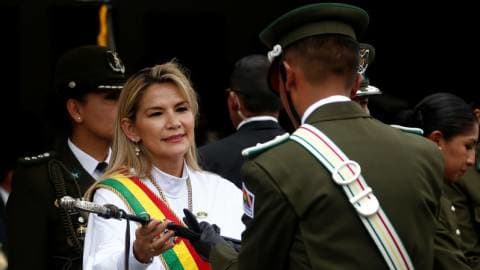
By Daniel Ramos and Mitra Taj
LA PAZ/COCHABAMBA, Bolivia (Reuters) - Bolivia's interim government has named a temporary ambassador to the United States for the first time in more than a decade amid a redrawing of the South American nation's international ties, including its shunning of traditional allies Venezuela and Cuba.
Bolivian foreign policy has shifted sharply in just two weeks under conservative interim President Jeanine Anez, a senator who took over in a power vacuum left by the resignation and exile of long-term leftist leader Evo Morales.
On Tuesday, Anez's foreign minister nominated Walter Oscar Serrate Cuellar as ambassador of a temporary, special mission to the United States, the first such envoy since 2008 when diplomatic relations with Washington soured under Morales.
Foreign Minister Karen Longaric said the short-term appointment would help pave the way for better relations with the United States.
"The next administration will surely name permanent ambassadors and those designations will need to be approved by the Senate," Longaric said.
Bolivia was plunged into turmoil after the Oct. 20 presidential election was marred by allegations it had been rigged in favor of Morales.
Morales, Bolivia's first indigenous leader, who had been in power since 2006, stepped down on Nov. 10 amid widespread protests against him. An international audit said the election should be annulled and police and the military withdrew support.
Anez, who has pledged new elections quickly and to restore peace in the divided country, has moved abruptly away from policies under Morales, expelling Venezuelan officials and edging closer to allies in Brazil and the United States.
Her administration has, however, been dogged by allegations that security forces have used excessive force against pro-Morales supporters, with human rights groups calling for an international investigation.
Since the October election 33 people have died in violent clashes, according to Bolivia's official human rights ombudsman, the vast majority since Morales resigned and subsequently sought asylum in Mexico.
(Reporting by Daniel Ramos and Monica Machicao in La Paz, Mitra Taj in Cochabamba; Writing by Adam Jourdan; editing by Jonathan Oatis and Grant McCool)